四川省宜宾六中外研版高二英语课件:Module 1 British and American English
文档属性
| 名称 | 四川省宜宾六中外研版高二英语课件:Module 1 British and American English | 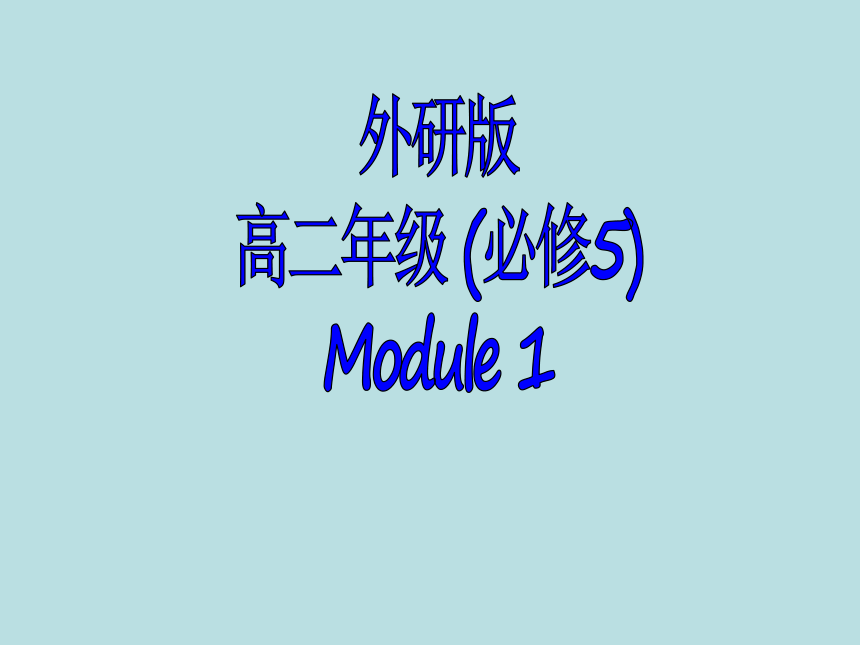 | |
| 格式 | zip | ||
| 文件大小 | 277.8KB | ||
| 资源类型 | 教案 | ||
| 版本资源 | 外研版 | ||
| 科目 | 英语 | ||
| 更新时间 | 2012-12-06 21:31:16 | ||
图片预览

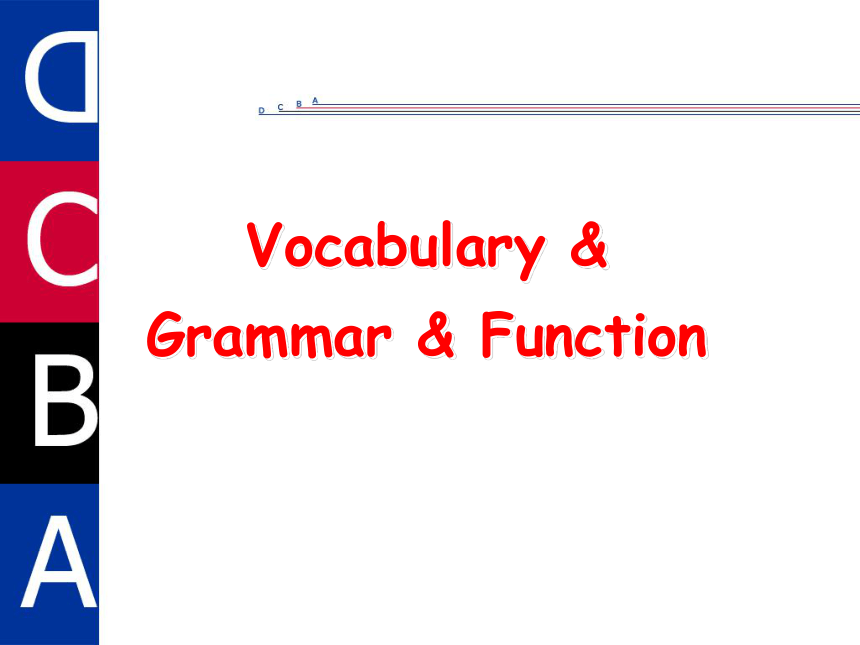
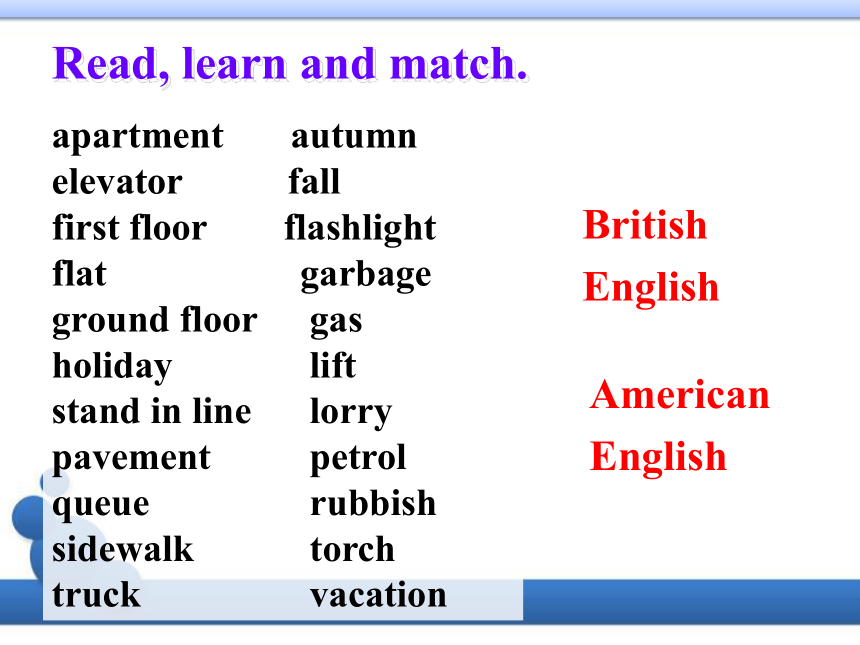
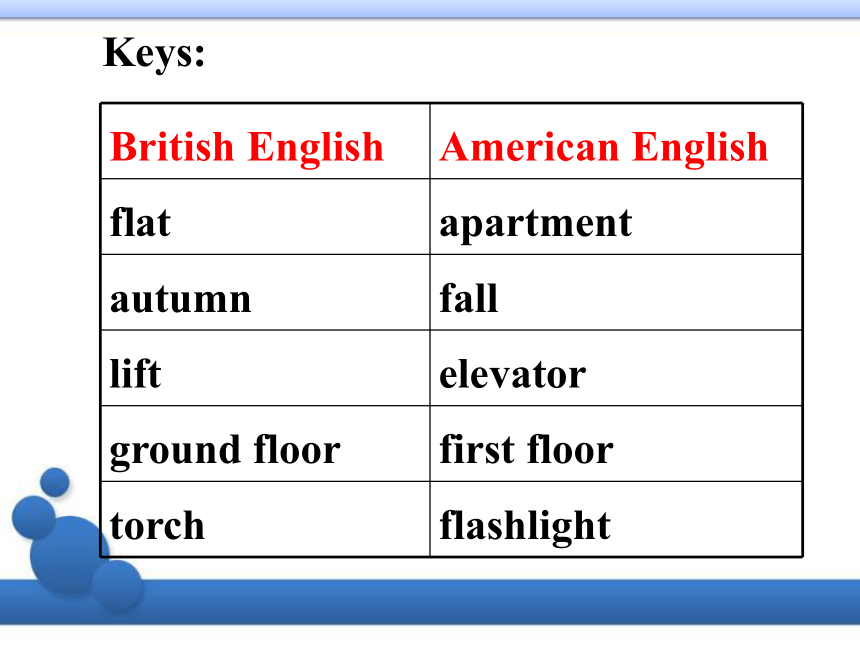
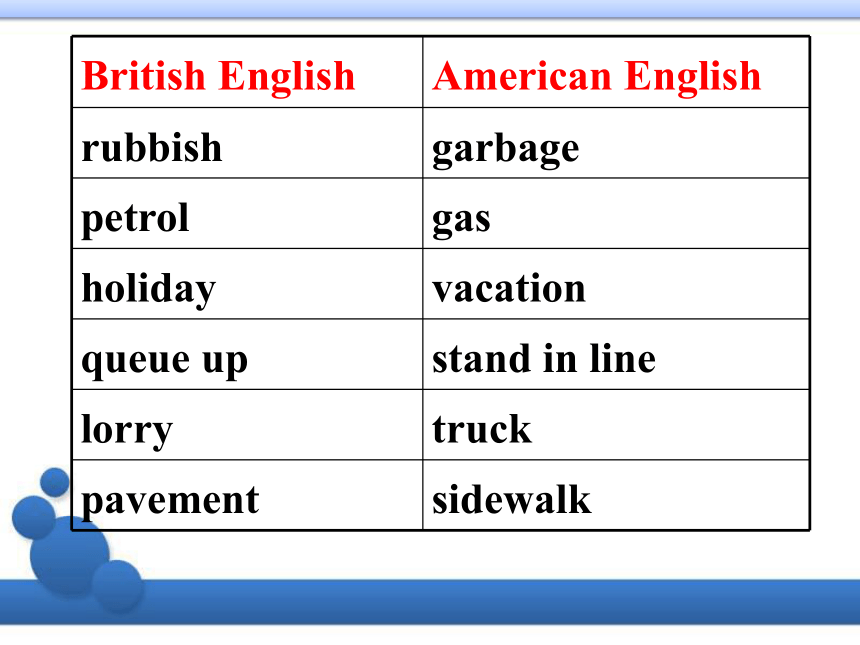
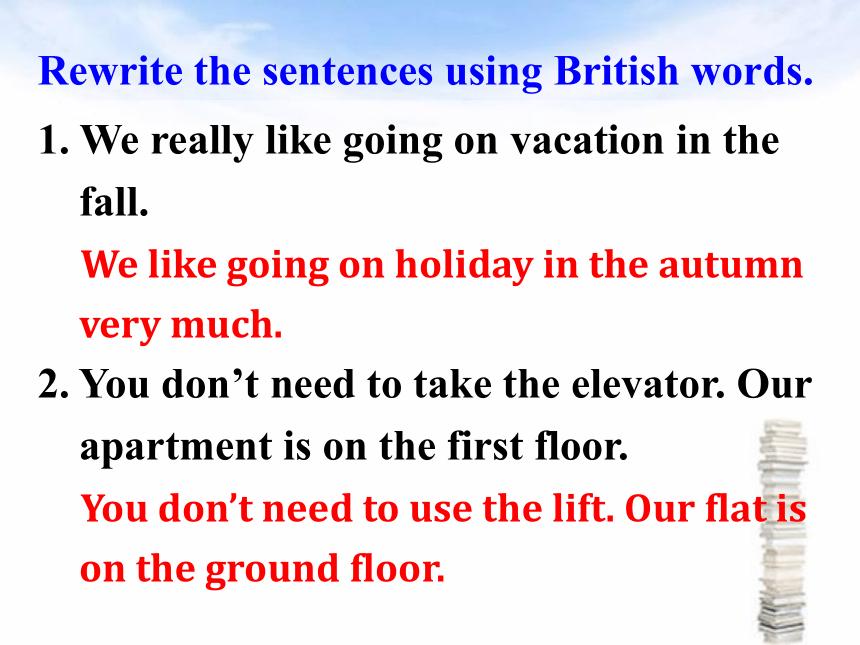
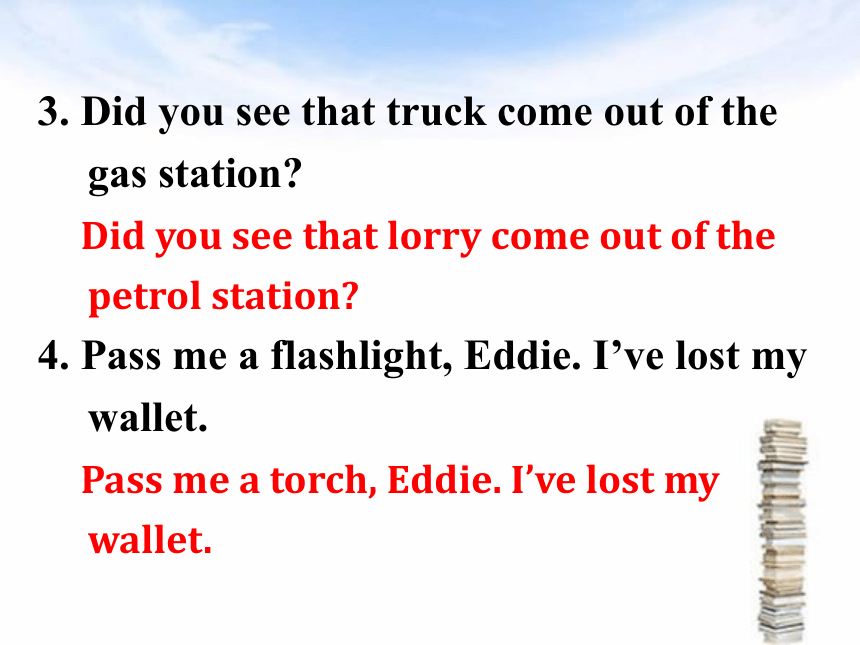
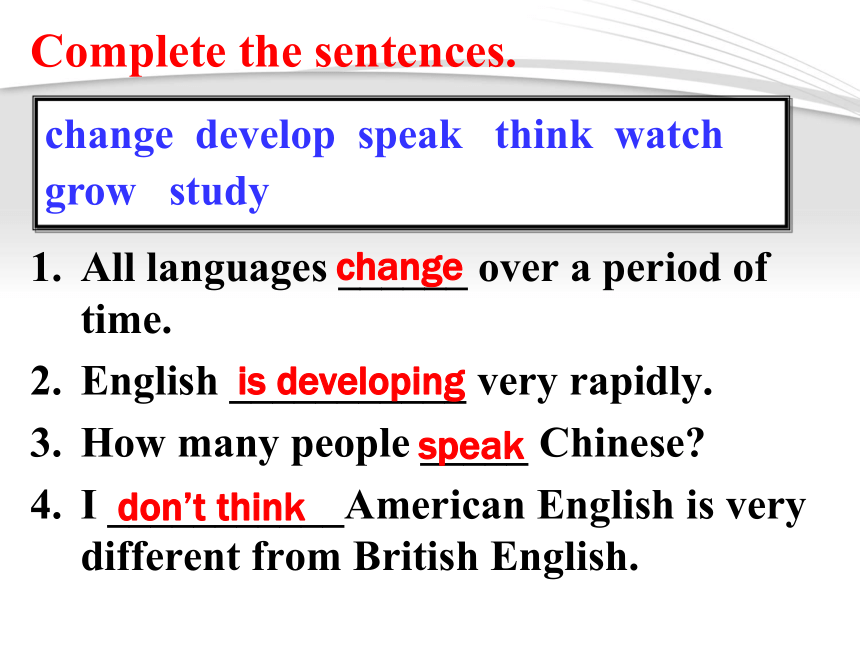
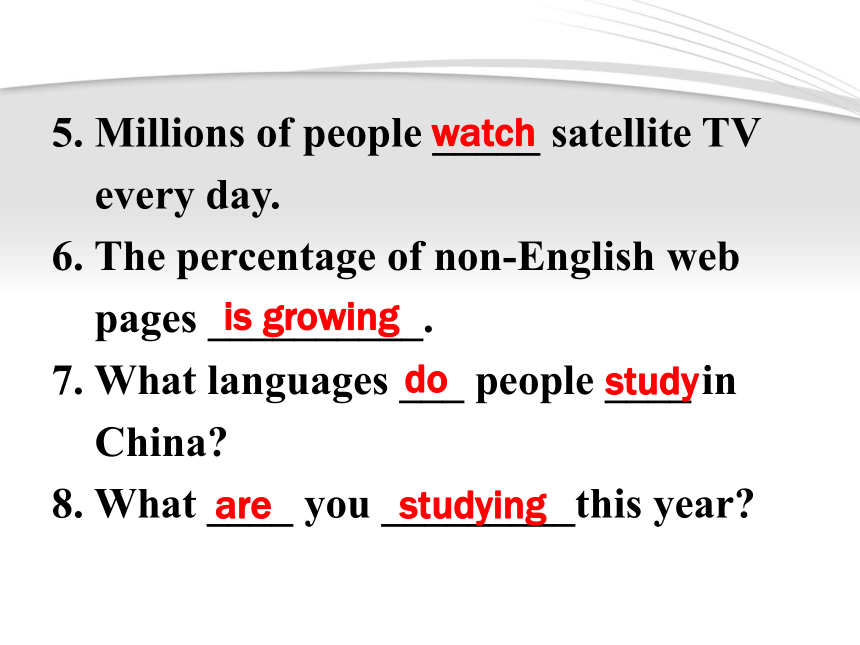
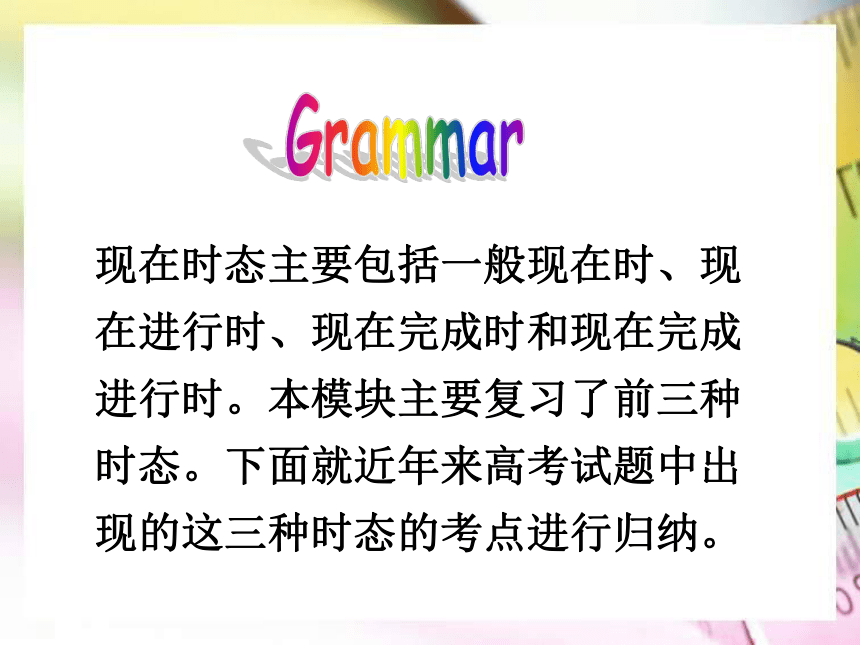
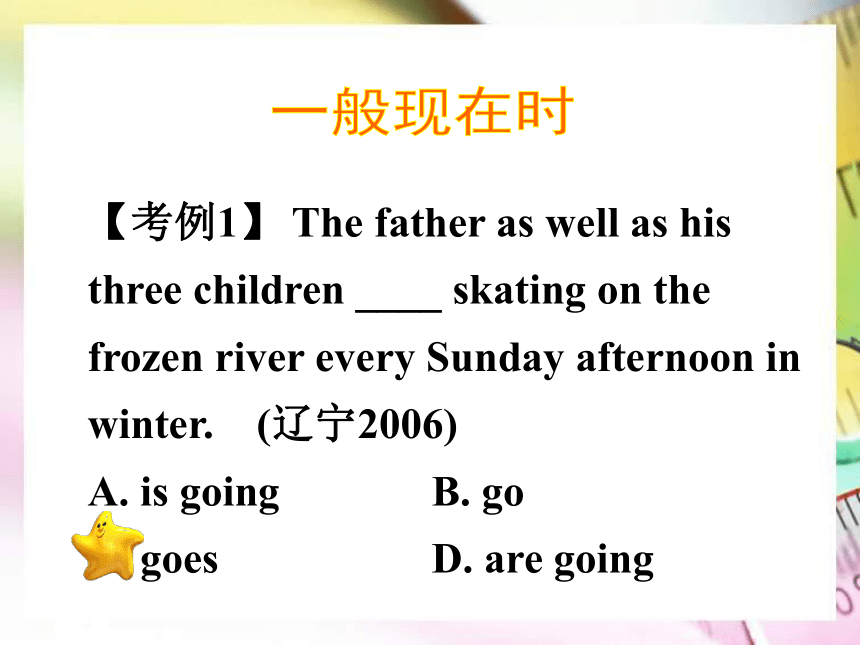
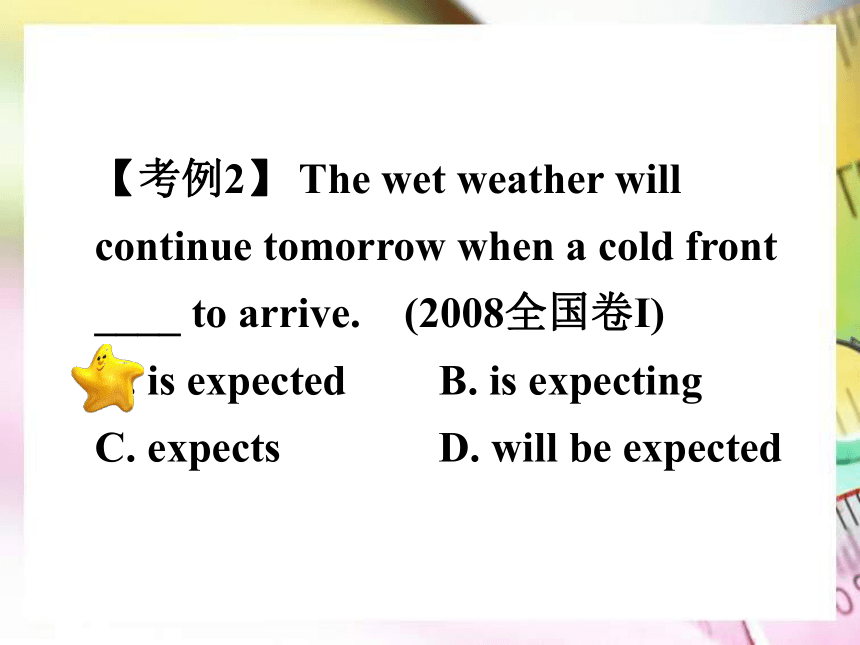
文档简介
课件44张PPT。外研版
高二年级 (必修5)
Module 1 Vocabulary & Grammar & FunctionRead, learn and match.apartment autumn elevator fall
first floor flashlight
flat garbage ground floor gas
holiday lift
stand in line lorry pavement petrol queue rubbish sidewalk torch
truck vacationBritish
EnglishAmerican
EnglishKeys:Rewrite the sentences using British words.1. We really like going on vacation in the fall.
We like going on holiday in the autumn very much.
2. You don’t need to take the elevator. Our apartment is on the first floor.
You don’t need to use the lift. Our flat is on the ground floor. 3. Did you see that truck come out of the gas station?
Did you see that lorry come out of the petrol station?
4. Pass me a flashlight, Eddie. I’ve lost my wallet.
Pass me a torch, Eddie. I’ve lost my wallet.Complete the sentences.All languages ______ over a period of time.
English ___________ very rapidly.
How many people _____ Chinese?
I ___________American English is very different from British English.change develop speak think watch grow studychangeis developingspeakdon’t think5. Millions of people _____ satellite TV
every day.
6. The percentage of non-English web
pages __________.
7. What languages ___ people ____ in
China?
8. What ____ you _________this year?watchis growingdostudyarestudying现在时态主要包括一般现在时、现在进行时、现在完成时和现在完成进行时。本模块主要复习了前三种时态。下面就近年来高考试题中出现的这三种时态的考点进行归纳。Grammar【考例1】 The father as well as his three children ____ skating on the frozen river every Sunday afternoon in winter. (辽宁2006)
A. is going B. go
C. goes D. are going一般现在时【考例2】 The wet weather will continue tomorrow when a cold front ____ to arrive. (2008全国卷I)
A. is expected B. is expecting
C. expects D. will be expected【考例3】 The house belongs to my aunt but she ____ here any more. (2006全国卷I)
A. hasn’t lived B. didn’t live
C. hadn’t lived D. doesn’t live【考例4】 Months ago we sailed ten thousand miles across this open sea, which ____ the Pacific, and we met no storms. (辽宁2005)
A. was called B. is called
C. had been called D. has been called【自我归纳】
1. 一般现在时可以用来表示_______________的动作,如考例1;
2. 在时间、条件、让步状语从句中常用一般现在时表示将来时,如_____;
3. 一般现在时可以用来表示现在的情况或状态,如考例3;经常性、习惯性考例24. 一般现在时可以用来表示________________________, 如考例4;
5. 另外,一般现在时还可以用来表示主语的特征、性格或能力;还可用于begin,come,leave,go,arrive, start, stop, return等转移动词,表示按计划、规定、时刻安排好的要发生的动作。普遍真理和客观存在的事实现在进行时【考例5】 —What’s that noise?
—Oh, I forgot to tell you. The new machine _____. (浙江2008)
A. was tested B. will be tested
C. is being tested D. has been tested【考例6】 Teenagers _____ their health because they play computer games too much. (重庆2008)
A. have damaged B. are damaging
C. damaged D. will damage 【考例7】 Ladies and gentlemen, please fasten your seat belts. The plane _____. (福建2006)
A. takes off B. is taking off
C. has taken off D. took off【自我归纳】
1. 现在进行时表示说话时______________的动作,如考例5;
2. 现在进行时表示现阶段正在进行的动作,如______;
3. 现在进行时也可用于begin,come,leave,go, arrive, start, stop, return等转移动词,表示按计划、安排、打算要发生的动作,如考例7。考例6正在进行或发生现在完成时【考例8】
Up to now, the program _____ thousands of children who would otherwise have died.(山东2010)
A. would save B. saves
C. had saved D. has saved【考例9】 I like these English songs and they ____ many times on the radio. (安徽2008)
A. taught B. have taught
C. are taught D. have been taught【考例10】 —____ leave at the end of this month.
—I don’t think you should do that until _____ another job. (北京2006)
A. I’m going to; you’d found
B. I’m going to; you’ve found
C. I’ll; you’ll find
D. I’ll; you’d find【自我归纳】
现在完成时表示过去发生或已完成的某一动作对现在造成的影响或结果,也可表示过去已经开始, 持续到现在(可能还会继续进行下去)的动作或状态。
现在完成时可以和以下时间状语连用:till now,up to now, so far, in the past / last ... years, these few ...,for ..., since ... ;2. 现在完成时可以和already, yet, before, recently, lately等表示不确定的过去的时间状语连用;
3. 现在完成时还可以和表示_____的时间状语连用, 如: often, sometimes, rarely, ever, never, once, ... times等;
4. 另外, 现在完成时还可以用在_____或条件状语从句中, 表示将来某时已完成的动作。时间频度【即学即练】 翻译下列句子。
1. 我们见面时我会和你讨论此事。
2. 对不起, 你不能把这本字典拿走。我正在用它。I’ll discuss this matter with you when we meet.
Sorry, you can’t take the dictionary away. I’m using it.3. 当我完成这本书的时候我会给你写信。I’ll write to you when I have finished the book.Complete the sentences with since and for.English grammar has not changed much ____ the time of Shakespeare.
The American spelling system has existed ____ about 200 years.
I have been studying English ______ I was in primary school.sincesincefor4. We have an American teacher. He has been here ____ January.
5. CNN has been on the air ___ more than 20 years.
6. Monita Raipal has worked for CNN _____ the year 2000.sinceforsince一. 现在完成时既可以与since引导的时间状语从句连用,又可以与since构成的短语连用。
1. since作连词,后跟句子,它所表示的时间是“从某一点开始”。若从句谓语为终止性动词,主句的时间则从这一“时刻”算起。 由since和for构成的句子或短语是现在完成时的常用状语。现就它们的用法作以下归纳。如: He has lived here since he lefts Shanghai.
若从句为延续性或状态性动词,则从其动作结束“那点”算起。例如:
It is six years since he was a teacher.
(2) I haven’t heard from her since she
lived there.2. since作介词,后跟表示时间的名词,必须是表示“时间的一点”,不能表示时间的一段。 例如:
He has taught at this school since 1965.二. 现在完成时与介词for构成的短语连用。
1. 介词for构成的短语,表示时间的长度,后跟一段时间,不能跟时间的一点。 例如:
(1) We have studied English for two years.
(2) They have known each other for five
years.2. 终止性动词不能与表示一段时间的介词for连用,但它的否定式可与介词for连用。例如:
I have not received his letter for two
months.
2) He has had the dictionary for two
weeks. (buy 用 have代替)
3) My father has been in the Party for
ten years. (join 用 be in)1. I like Leeds because there’s more going on here than back home in the States.
2. Since English is spoken all over the world, there are lots of varieties.
3. As I was the only British person in the
school, they made a fuss of me.
4. I’m getting on just fine, now that I
understand the local accent.Function: Giving reasonsUnderline the words which introduce reason.1) because语势最强, 用来说明人所不知的原因, 回答why提出的问题, 是句子中的重要部分, 常放在句末, 不能用其它三个替换。逗号可加可不加。 You can trust those products because the quality never changes.
I haven’t been to the cinema lately, because I am too busy.because, since, as, for 辨析2) 当原因是显而易见的或已为人们所知, 就用as或 since。since稍正式一些。
Since /As the weather is so bad, we have to delay our journey. 3) 由because引导的从句如果放在句末, 且前面有逗号, 则可以用for来代替。但如果不是说明直接原因, 而是多种情况加以推断, 就只能用for。
He is absent today, because/for he is ill.
He must be ill, for he is absent today. 4) 当because引导的从句与否定的主句连用, 而主句又位于句首时, 之前不用逗号, 因为主句动词否定的是其后的全部内容。为了突出because从句, because前常加上副词, 如: just, only, simply, chiefly等。 You should not despise a man just because he is poorly dressed.
She is not marrying Bill, because he is poor.Which word do we use more often to introduce a reason?
Which expression shows that a situation has changed?
3. Which two words often come at the beginning of a sentence?BecauseNow thatSince and asComplete the sentences with because, since/as or now that.1. It is useful to learn English ________ it is spoken all over the world.
2. ________ they see lots of American films, the British are used to American accents.because/asSince/As3. Americans like the British accent _______ they think it is cute.
4. It’s easier to compare British and American English ________ we have the Internet.becausenow that
高二年级 (必修5)
Module 1 Vocabulary & Grammar & FunctionRead, learn and match.apartment autumn elevator fall
first floor flashlight
flat garbage ground floor gas
holiday lift
stand in line lorry pavement petrol queue rubbish sidewalk torch
truck vacationBritish
EnglishAmerican
EnglishKeys:Rewrite the sentences using British words.1. We really like going on vacation in the fall.
We like going on holiday in the autumn very much.
2. You don’t need to take the elevator. Our apartment is on the first floor.
You don’t need to use the lift. Our flat is on the ground floor. 3. Did you see that truck come out of the gas station?
Did you see that lorry come out of the petrol station?
4. Pass me a flashlight, Eddie. I’ve lost my wallet.
Pass me a torch, Eddie. I’ve lost my wallet.Complete the sentences.All languages ______ over a period of time.
English ___________ very rapidly.
How many people _____ Chinese?
I ___________American English is very different from British English.change develop speak think watch grow studychangeis developingspeakdon’t think5. Millions of people _____ satellite TV
every day.
6. The percentage of non-English web
pages __________.
7. What languages ___ people ____ in
China?
8. What ____ you _________this year?watchis growingdostudyarestudying现在时态主要包括一般现在时、现在进行时、现在完成时和现在完成进行时。本模块主要复习了前三种时态。下面就近年来高考试题中出现的这三种时态的考点进行归纳。Grammar【考例1】 The father as well as his three children ____ skating on the frozen river every Sunday afternoon in winter. (辽宁2006)
A. is going B. go
C. goes D. are going一般现在时【考例2】 The wet weather will continue tomorrow when a cold front ____ to arrive. (2008全国卷I)
A. is expected B. is expecting
C. expects D. will be expected【考例3】 The house belongs to my aunt but she ____ here any more. (2006全国卷I)
A. hasn’t lived B. didn’t live
C. hadn’t lived D. doesn’t live【考例4】 Months ago we sailed ten thousand miles across this open sea, which ____ the Pacific, and we met no storms. (辽宁2005)
A. was called B. is called
C. had been called D. has been called【自我归纳】
1. 一般现在时可以用来表示_______________的动作,如考例1;
2. 在时间、条件、让步状语从句中常用一般现在时表示将来时,如_____;
3. 一般现在时可以用来表示现在的情况或状态,如考例3;经常性、习惯性考例24. 一般现在时可以用来表示________________________, 如考例4;
5. 另外,一般现在时还可以用来表示主语的特征、性格或能力;还可用于begin,come,leave,go,arrive, start, stop, return等转移动词,表示按计划、规定、时刻安排好的要发生的动作。普遍真理和客观存在的事实现在进行时【考例5】 —What’s that noise?
—Oh, I forgot to tell you. The new machine _____. (浙江2008)
A. was tested B. will be tested
C. is being tested D. has been tested【考例6】 Teenagers _____ their health because they play computer games too much. (重庆2008)
A. have damaged B. are damaging
C. damaged D. will damage 【考例7】 Ladies and gentlemen, please fasten your seat belts. The plane _____. (福建2006)
A. takes off B. is taking off
C. has taken off D. took off【自我归纳】
1. 现在进行时表示说话时______________的动作,如考例5;
2. 现在进行时表示现阶段正在进行的动作,如______;
3. 现在进行时也可用于begin,come,leave,go, arrive, start, stop, return等转移动词,表示按计划、安排、打算要发生的动作,如考例7。考例6正在进行或发生现在完成时【考例8】
Up to now, the program _____ thousands of children who would otherwise have died.(山东2010)
A. would save B. saves
C. had saved D. has saved【考例9】 I like these English songs and they ____ many times on the radio. (安徽2008)
A. taught B. have taught
C. are taught D. have been taught【考例10】 —____ leave at the end of this month.
—I don’t think you should do that until _____ another job. (北京2006)
A. I’m going to; you’d found
B. I’m going to; you’ve found
C. I’ll; you’ll find
D. I’ll; you’d find【自我归纳】
现在完成时表示过去发生或已完成的某一动作对现在造成的影响或结果,也可表示过去已经开始, 持续到现在(可能还会继续进行下去)的动作或状态。
现在完成时可以和以下时间状语连用:till now,up to now, so far, in the past / last ... years, these few ...,for ..., since ... ;2. 现在完成时可以和already, yet, before, recently, lately等表示不确定的过去的时间状语连用;
3. 现在完成时还可以和表示_____的时间状语连用, 如: often, sometimes, rarely, ever, never, once, ... times等;
4. 另外, 现在完成时还可以用在_____或条件状语从句中, 表示将来某时已完成的动作。时间频度【即学即练】 翻译下列句子。
1. 我们见面时我会和你讨论此事。
2. 对不起, 你不能把这本字典拿走。我正在用它。I’ll discuss this matter with you when we meet.
Sorry, you can’t take the dictionary away. I’m using it.3. 当我完成这本书的时候我会给你写信。I’ll write to you when I have finished the book.Complete the sentences with since and for.English grammar has not changed much ____ the time of Shakespeare.
The American spelling system has existed ____ about 200 years.
I have been studying English ______ I was in primary school.sincesincefor4. We have an American teacher. He has been here ____ January.
5. CNN has been on the air ___ more than 20 years.
6. Monita Raipal has worked for CNN _____ the year 2000.sinceforsince一. 现在完成时既可以与since引导的时间状语从句连用,又可以与since构成的短语连用。
1. since作连词,后跟句子,它所表示的时间是“从某一点开始”。若从句谓语为终止性动词,主句的时间则从这一“时刻”算起。 由since和for构成的句子或短语是现在完成时的常用状语。现就它们的用法作以下归纳。如: He has lived here since he lefts Shanghai.
若从句为延续性或状态性动词,则从其动作结束“那点”算起。例如:
It is six years since he was a teacher.
(2) I haven’t heard from her since she
lived there.2. since作介词,后跟表示时间的名词,必须是表示“时间的一点”,不能表示时间的一段。 例如:
He has taught at this school since 1965.二. 现在完成时与介词for构成的短语连用。
1. 介词for构成的短语,表示时间的长度,后跟一段时间,不能跟时间的一点。 例如:
(1) We have studied English for two years.
(2) They have known each other for five
years.2. 终止性动词不能与表示一段时间的介词for连用,但它的否定式可与介词for连用。例如:
I have not received his letter for two
months.
2) He has had the dictionary for two
weeks. (buy 用 have代替)
3) My father has been in the Party for
ten years. (join 用 be in)1. I like Leeds because there’s more going on here than back home in the States.
2. Since English is spoken all over the world, there are lots of varieties.
3. As I was the only British person in the
school, they made a fuss of me.
4. I’m getting on just fine, now that I
understand the local accent.Function: Giving reasonsUnderline the words which introduce reason.1) because语势最强, 用来说明人所不知的原因, 回答why提出的问题, 是句子中的重要部分, 常放在句末, 不能用其它三个替换。逗号可加可不加。 You can trust those products because the quality never changes.
I haven’t been to the cinema lately, because I am too busy.because, since, as, for 辨析2) 当原因是显而易见的或已为人们所知, 就用as或 since。since稍正式一些。
Since /As the weather is so bad, we have to delay our journey. 3) 由because引导的从句如果放在句末, 且前面有逗号, 则可以用for来代替。但如果不是说明直接原因, 而是多种情况加以推断, 就只能用for。
He is absent today, because/for he is ill.
He must be ill, for he is absent today. 4) 当because引导的从句与否定的主句连用, 而主句又位于句首时, 之前不用逗号, 因为主句动词否定的是其后的全部内容。为了突出because从句, because前常加上副词, 如: just, only, simply, chiefly等。 You should not despise a man just because he is poorly dressed.
She is not marrying Bill, because he is poor.Which word do we use more often to introduce a reason?
Which expression shows that a situation has changed?
3. Which two words often come at the beginning of a sentence?BecauseNow thatSince and asComplete the sentences with because, since/as or now that.1. It is useful to learn English ________ it is spoken all over the world.
2. ________ they see lots of American films, the British are used to American accents.because/asSince/As3. Americans like the British accent _______ they think it is cute.
4. It’s easier to compare British and American English ________ we have the Internet.becausenow that
